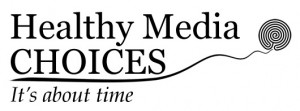 LISTEN TO MARY ROTHSCHILD, PART 1
LISTEN TO MARY ROTHSCHILD, PART 1
Audio clip: Adobe Flash Player (version 9 or above) is required to play this audio clip. Download the latest version here. You also need to have JavaScript enabled in your browser.
“It’s not about the kids. It’s really about us,” said Mary Rothschild, founder and director of Healthy Media Choices. “[Studies] found [that] at the end of the TV Turnoff Weeks, when families had turned off television – now it’s so much more than television to turn off – it wasn’t the kids who turned it back on, it was the parents. We’re tired. That’s a perfectly legitimate thing. We need down time and we need to have strategies that allow us to have that down time. We need to take care of ourselves, but not at the expense of the child.”
“You really have to have a kind of media literacy framework for parents now,” said Rothschild. Parents need to be able to “look and see what it actually is [that their kids are watching]. It’s not just cute. It’s going to lead to products that the child wants and begs for that the family may not be able to buy. But also it’s a world view. It’s a story being told. The child gets very attached to these characters and that attachment is then something to buy. In fact, thousands of things, [which leads to] the child [having] a very commercialized view of life. It’s very difficult for us to get our stories through that.”
This past June, in between events at the Network of Spiritual Progressives’ conference on “Corporate Domination of American Politics and Culture” at the Church of the Reformation in the Capitol Hill neighborhood, Rothschild discussed the deregulation of children’s television programming during the 1980s. “[President Reagan] said, basically, We don’t need a national nanny. You [TV networks] know what you’re doing better than we do. And deregulation happened. Within the next year, the top ten selling toys were knockoffs from [children’s programming].”
“This has implications for play, which is how children learn about themselves. When they play with something they’ve seen on a screen – only… acting in one way, very often a violent or aggressive way – that’s the only way they can play with it. They find it very difficult to impinge their own imagination on that stereotyped article… This is one of the things teachers are seeing, [a] dramatic change in children’s ability to play spontaneously.”
“[This] has tremendous implications for us as a society because… we learn to think for ourselves… by experimenting in play in early childhood,” said Rothschild. “What’s going to happen to civil society if we have generations growing up without having the ability to think for themselves?”
Related Links:
www.HealthyMediaChoices.org
www.WitnessForChildhood.org
